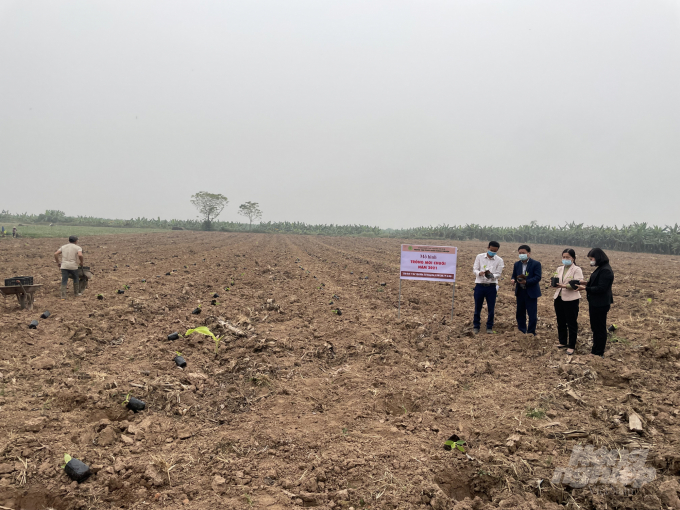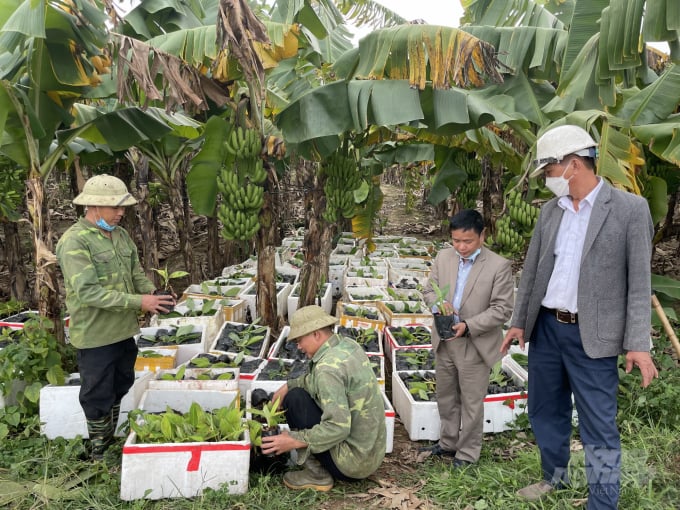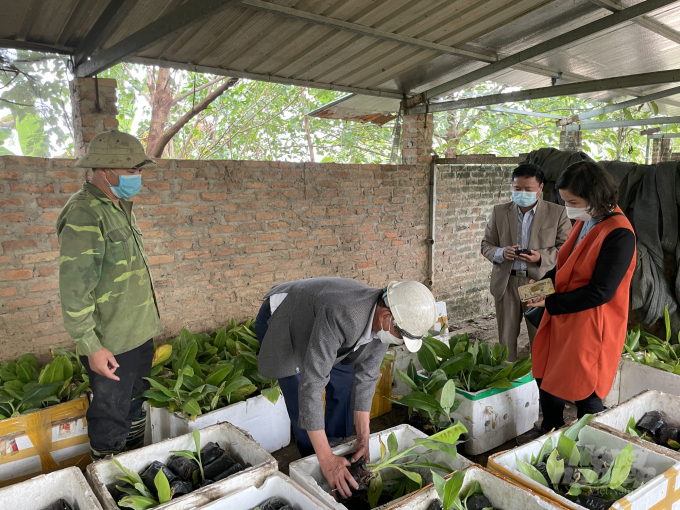June 15, 2025 | 20:39 GMT +7
June 15, 2025 | 20:39 GMT +7
Hotline: 0913.378.918
June 15, 2025 | 20:39 GMT +7
Hotline: 0913.378.918
Banana is one of four main fruit trees of Hanoi together with grapefruit, longan and orange. Some banana-growing areas have been formed in the districts of Gia Lam, Thuong Tin, Me Linh, Dan Phuong, Ba Vi and Phuc Tho.
According to Duong Van Son, Deputy Plant Experiment Station of Hanoi Agricultural Development Center, riverside areas are suitable for growing bananas while Hanoi has many rivers including Red River, Tich River, Day River and Da River.
Banana farming generates quite high economic value. According to the city’s 2019 Statistical Yearbook, Hanoi has 3,294 ha of banana, its banana output is about 74,195 tonnes, each ha of banana generates about VND350-400 million.
However, two big problems that banana farming usually face lies in banana consumption and Panama disease or banana wilt, a devastating disease of bananas caused by the soil-inhabiting fungus species Fusarium oxysporum forma specialis cubense.
Son said that as farmers grew bananas spontaneously without planning, they faced difficulties in banana consumption. The consumption was completely dependent on Chinese traders through unofficial channels with a small volume.
To deal with Panama disease, it is necessary to take samples for analysis, choose disease-free areas or if the banana trees are infected a little, there will be measures to handle.

Farmers prepare soil to grow banana.
Seeing the above problems, Hanoi City People’s Committee issued Decision No. 5472/QD-UBND approving the Plan to develop banana production for export in the period 2021-2025. Accordingly, technical standards will be applied to make Hanoi’s banana eligible for official export to many countries, not just depending on the Chinese market.
The Hanoi Agricultural Development Center is the unit assigned by the City and the Hanoi Department of Agriculture and Rural Development to directly implement this plan.
To determine the appropriate planting area, since early this year, the department has examined banana-growing areas with an area large enough to develop into a commodity production area of 28 communes in 7 districts. The department took samples of soil and trunks, banana roots to analyze the fungus Panama disease.
After testing a total of 185 soil samples, 185 root samples, and 185 stem samples of each type, the department identified safe and stable banana-growing areas including Co Bi, Phu Thi (Gia Lam district), Tu Nhien commune, and Co Bi commune (Thuong Tin district), Nam Son commune (Soc Son district), Hoang Kim commune, Van Khe commune (Me Linh district), Hong Ha commune (Dan Phuong district), Van Nam commune (Phuc Tho district), Thuan My commune, Phu Phuong (Ba Vi district).

Banana seedling.
On September 23, 2021, the Plant Protection Department issued an official dispatch to grant the certificate of banana planting areas to Hanoi.
Hanoi Agricultural Development Center organised intensive training for 30 staff on management, planting, care, application of high technology, preliminary processing, preservation, trade promotion, brand recognition, trade brand, management, value chain building. A total of 300 staff and farmers were trained on planting, caring, pest control, harvesting, preliminary processing and preservation of bananas.
The centre supported to grow 11 ha of bananas following VietGAP standards in Hoang Kim commune, Me Linh district. The automatic irrigation system here has greatly reduced labour costs, saved water and increased efficiency. The farming households here have also followed the correct technical process with full diary recording.
To improve banana quality and productivity to satisfy requirements for export, the centre also implemented technical solutions from production to collection on an area of 10 ha in Hong Ha commune, Dan Phuong district.

Farmers prepare to transport bananam seedlings.
In 2021, Hanoi Agricultural Development Center has supported granting 3 planting area codes according to OTAS standards for domestic consumption and export. Specifically, Van Khe commune, Me Linh district has a 15-ha riverside banana-growing area and Hong Ha commune, Dan Phuong district has over 30 ha for growing banana in two riverside areas.
According to Hoang Thi Hoa, Director of Hanoi Agricultural Development Center, the issuance of the planting area code help Hanoi's banana products be easier to reach many markets.
This technical barrier posed difficulty for many banana-growing areas in Việt Nam for years.
To ensure the sustainable consumption of banana products, three companies committed to joining authorities. Besides fresh banana products, dried bananas, dried sliced bananas for domestic consumption and export, banana stalks would be used to draw yarn to weave bags, make handicrafts, and sell leaves to shops for packing agricultural products. Banana stems will be used to make fertilizer.
Although there have been new and positive signals, shortcomings and limitations remained, particularly in connecting businesses and farmers. The link between production and consumption is still loose.
Leaders of some communes and cooperatives are still afraid of difficulties and have not done well in management, communication with farmers. Improper understanding about export-oriented banana production of some commune officials and cooperatives caused difficulties to the management and coordination of the agriculture centre.
In 2022, the centre plans to support to development 25 ha of bananas, with a scale of 5 ha or more at each site. It will carry out synchronous production techniques to grow ten ha of banana for export, with a scale of 3 ha or more at each site.
It will also support piloting a pulley system to transport bananas as well as implementing pre-processing, packaging and post-harvest processing technology to improve product value.
Other activities include preserving bananas by cold storage with automatic temperature and humidity control; Supporting the development of production-consumption links towards export for enterprises and cooperatives.
Translated by Hien Anh
![Turning wind and rain into action: [4] Bringing climate bulletins to remote and isolated areas](https://t.ex-cdn.com/nongnghiepmoitruong.vn/608w/files/linhnhp/2025/06/14/1152-z6704423696987_15fd32ffc26d590d204d520c9dac6786-nongnghiep-151141.jpg)
(VAN) The Vietnam Agriculture and Nature Newspaper interviewed Mr. Vu Thai Truong, Acting Head of Climate Change and Environment at UNDP Vietnam, to gain deeper insight into how climate bulletins are delivered to farmers.

(VAN) In Tien Giang, a high-tech shrimp farm has developed a distinctive energy-saving farming model that has yielded promising results.
![Turning wind and rain into action: [3] 300.000 farmers benefit from agro-climatic bulletins](https://t.ex-cdn.com/nongnghiepmoitruong.vn/608w/files/news/2025/06/12/e5a48259d6a262fc3bb3-nongnghiep-125122.jpg)
(VAN) The agro-climatic bulletin has become a valuable tool for farmers in the Mekong Delta. After more than five years of implementation, the initiative is gradually being expanded nationwide.
![Turning wind and rain into action: [2] Providing forecasts to the people](https://t.ex-cdn.com/nongnghiepmoitruong.vn/608w/files/news/2025/06/12/e5a48259d6a262fc3bb3-nongnghiep-103927.jpg)
(VAN) In addition to improving the quality of hydrometeorological forecasts, putting forecast bulletins into practical use is crucial for production and disaster prevention.

(VAN) Blue carbon is receiving attention for its rapid absorption capacity and vast potential. It represents a promising nature-based solution to respond to climate change.
/2025/06/11/3507-1-161904_583.jpg)
(VAN) Seagrass beds and coral reefs serve as 'cradles' that nurture life in the ocean depths, creating rich aquatic resources in Vietnamese waters.
![Turning wind and rain into action: [1] Forecasting for farmers](https://t.ex-cdn.com/nongnghiepmoitruong.vn/608w/files/news/2025/06/11/e5a48259d6a262fc3bb3-nongnghiep-111919.jpg)
(VAN) Weather is no longer just a matter of fate. Forecasts have now become an essential companion for farmers in every crop season.